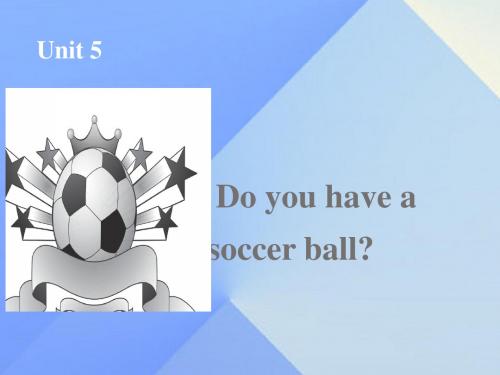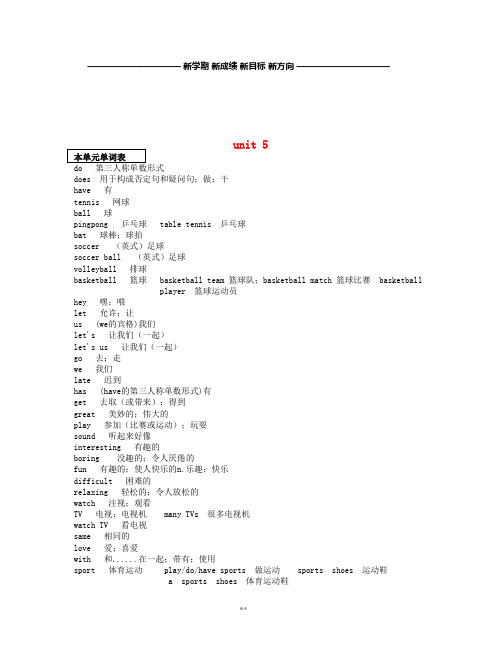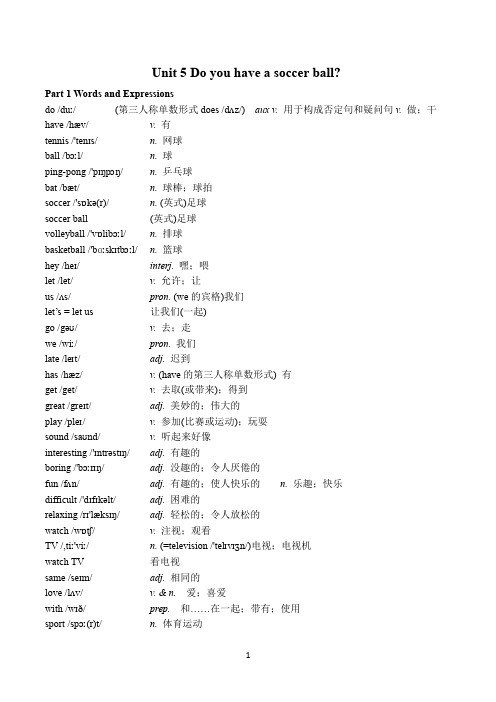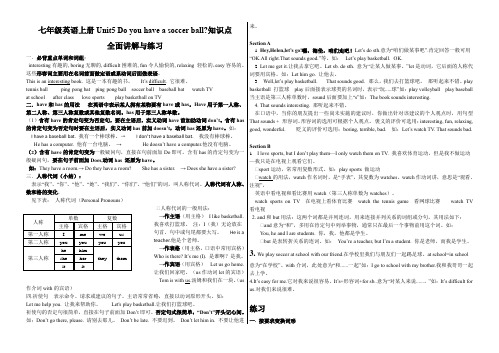2019秋七年级英语上册Unit5DoyouhaveasoccerballPeriod3SectionB(1a-1d)教案(新版)人教新目标版
新素质方略七年级英语上册Unit5Doyouhaveasoccerball

B. 本题考查的是实义动词一般疑问句,由于主语是you,此处只能用do.
Words
soccer n.
名词,意为“(英式)足球”。也可以说soccer ball。
Expressions
小练习:单项选择
-Let’s play volleyball! -.
A. Thank you
B. Yes, please
C. That sounds good. D. That sound good.
C. A、B不符合题意,C 、D两项sound的形式能与主语that相对 应的是C
get to意为“到达”,get down意为“下来;落下”,get up意为“起床”,只有B项 get on
with sb意为“与某人相处”。因此选B。
Expand
真题演练
3.______your friends have a wonderful journey?
A. Are
B. Is
C. Do
Translations
Helen: Bill has it. 海伦:比尔有。 Cindy: Oh, yeah. And do you have your jacket? 辛蒂:哦,好的。那你穿你的夹克吗? Helen: Oh, no, I don’t. It’s on the chair. Let me get it. 海伦:噢,不,我没有。它是在椅子上。让我去取吧。 Cindy: And your hat, too! 辛迪:还有你的帽子! Helen: OK, I have my jacket and hat. Let’s go. 海伦:嗯,我拿了我的夹克和帽子。我们走吧。
七年级英语上册 Unit 5 Do you have a soccer ball(单词+重点句型)语法解析

——————————新学期新成绩新目标新方向——————————unit 5does 用于构成否定句和疑问句;做;干have 有tennis 网球ball 球pingpong 乒乓球 table tennis 乒乓球bat 球棒;球拍soccer (英式)足球soccer ball (英式)足球volleyball 排球basketball 篮球 basketball team 篮球队;basketball match 篮球比赛 basketball player 篮球运动员hey 嘿;喂let 允许;让us (we的宾格)我们let's 让我们(一起)let's us 让我们(一起)go 去;走we 我们late 迟到has (have的第三人称单数形式)有get 去取(或带来);得到great 美妙的;伟大的play 参加(比赛或运动);玩耍sound 听起来好像interesting 有趣的boring 没趣的;令人厌倦的fun 有趣的;使人快乐的n.乐趣;快乐difficult 困难的relaxing 轻松的;令人放松的watch 注视;观看TV 电视;电视机 many TVs 很多电视机watch TV 看电视same 相同的love 爱;喜爱with 和......在一起;带有;使用sport 体育运动 play/do/have sports 做运动 sports shoes 运动鞋a sports shoes 体育运动鞋them (they的宾格)他(她、它)们only 只;仅like 喜欢;喜爱easy 容易的;不费力的after 在......以后class 班级;课(近义词:lessen);等级;类别;阶段classmate 同班同学 roommate 室友 workmate 同事 deskmate 同桌schoolmate 校友Bill 比尔(男名)on的用法,详见unit4【解析】on可以表示“通过;使用……方式”,后面通常接表示通信工具的名词。
新目标英语七年级上册_unit_5_Do_you_have_a_soccer_ball B

let sb. do sth让某人做某事
Grammar Focus:
Do you have a baseball?
Yes, I do./ No, I don't. I have a volleyball.
Do you have a ping-pong bat?
where's=where is ,对地点提问,后接单数名词。
Let's 是 let us的缩写。 let’s包括说话人在内,let us不包括说话人在内。 本句是以let开头的祈使句,结构为“Let’s do sth.”, 意为“咱们……吧”,常用于提出建议。如: Let’s play basketball.
Yes, I do./ No, I don't. I have a ping-pong ball. Yes, they do./ No, they don't. They have a volleyball.
Do they have a basketball?
Does she have a tennis ball? Does he have a soccer ball?
× ×
×
1b Listen and circle the words you hear.
ping-pong bat
volleyball
soccer ball
ping-pong ball
Listening
A: Do you have a ping-pong bat?
B: Yes, I do.
A: Do you have a ping-pong ball?
Unit 5 Do you have a soccer ball 知识点归纳-七年级上册英语

人教版新目标七上英语单元知识点归纳Unit 5 Do you have a soccer ball?重点词汇tennis/'tenis/ n. 网球bat /bæt/ n. 球棒;球拍soccer ball (英式)足球volleyball/'vɔlibɔ:l/ n. 排球basketball/'ba:skitbɔ:l/ n. 篮球late/leit/ adj. 迟到great/greit/ adj. 美妙的;伟大的play/plei/ v. 参加(比赛或运动);玩耍sound/saund/ v. 听起来好像interesting/'intrəstiŋ/ adj. 有趣的boring/'bɔ:riŋ/ adj. 没趣的;令人厌倦的fun/fʌn/ adj. 有趣的;使人快乐的n.乐趣;快乐difficult/'difikəlt/ adj. 困难的relaxing/ri'læksiŋ/ adj. 轻松的;令人放松的watch/wɔtʃ/ v. 注视;观看same/seim/ adj. 相同的easy/'i:zi/ adj. 容易的;不费力的class/kla:s/ n. 班级;课classmate/'kla:smeit/ n. 同班同学重点短语:a tennis bat 一个网球拍play basketball 打篮球baseball bat 棒球棒have a soccer ball 有一个足球play soccer 踢足球with our friends 和我们的朋友一起have a ping-pong ball 有一个乒乓球play ping-pong 打乒乓球have a volleyball 有一个排球play volleyball 打排球at school 在校,上学play sports 做运动watch TV 看电视in my bag 在我的包里be late 迟到on TV 电视上必背典句:1. Do you have a soccer ball? 你有一个足球吗?2. Does he/she have a ping-pong ball?他/她有一个乒乓球吗?3. Do you play sports with your classmates? 你和你的同学一起做运动吗?4. Let’s play soccer together! 我们一起踢足球吧!5. How many sports do you like?你喜欢多少种运动?6. I like playing soccer and basketball. 我喜欢踢足球和打篮球。
Unit 5 Do you have a soccer ball 七年级上课文原文及重点

Unit 5 Do you have a soccer ball?Part 1 Words and Expressionsdo /duː/ (第三人称单数形式does /dʌz/) aux v.用于构成否定句和疑问句v.做;干have /hæv/ v.有tennis /'tenɪs/ n. 网球ball /bɔːl/ n.球ping-pong /'pɪŋpɔŋ/ n. 乒乓球bat /bæt/ n. 球棒;球拍soccer /'sɒkə(r)/ n. (英式)足球soccer ball (英式)足球volleyball /'vɒlibɔːl/ n.排球basketball /'bɑːskɪtbɔːl/ n.篮球hey /heɪ/ interj.嘿;喂let /let/ v. 允许;让us /ʌs/ pron. (we的宾格)我们let’s = let us 让我们(一起)go /gəʊ/ v.去;走we /wiː/ pron.我们late /leɪt/ adj. 迟到has /hæz/ v. (have的第三人称单数形式) 有get /get/ v.去取(或带来);得到great /greɪt/ adj.美妙的;伟大的play /pleɪ/ v. 参加(比赛或运动);玩耍sound /saʊnd/ v.听起来好像interesting /'ɪntrəstɪŋ/ adj.有趣的boring /'bɔːrɪŋ/adj.没趣的;令人厌倦的fun /fʌn/ adj.有趣的;使人快乐的n.乐趣;快乐difficult /'dɪfɪkəlt/ adj. 困难的relaxing /rɪ'læksɪŋ/ adj.轻松的;令人放松的watch /wɒtʃ/ v.注视;观看TV /,tiː'viː/ n. (=television /'telɪvɪʒn/)电视;电视机watch TV看电视same /seɪm/ adj. 相同的love /lʌv/ v. & n. 爱;喜爱with /wɪð/ prep.和……在一起;带有;使用sport /spɔː(r)t/ n. 体育运动them /ðəm/ pron. (they的宾格) 他(她、它)们only /'əʊnli/ adv.只;仅like /laɪk/ v. 喜欢;喜爱easy /'iːzi/ adj.容易的;不费力的after /'ɑːftə(r)/prep. & conj.在……之后class /klɑːs/ n.班级;课classmate /'klɑːsmeɪt/ n.同班同学Bill /bɪl/比尔(男名)Part 2:Texts课文(一)Cindy:Hey, Helen, let’s go! We’re late!Helen: OK.Cindy: Do you have the baseball?Helen: Yes, I do. It’s in my bag.Cindy: And where’s our baseball bat?Helen: Bill has it.Cindy: Oh, yeah. And do you have your jacket?Helen: Oh, no, I don’t. It’s on the chair. Let me get it. Cindy: And your hat, too!Helen: OK, I have my jacket and hat. Let’s go!Structure1. Do you have a baseball?Yes, I do./No, I don’t. I have a volleyball.2. Do you have a ping-pong bat?Yes, I do./No, I don’t. I have a ping-pong ball.3. Does she have a tennis ball?Yes, she does./No, she doesn’t. She has a baseball.4. Does he have a soccer ball?Yes, he does./No. he doesn’t. He has two ping-pong bats. 5. Do they have a basketball?句型:—Do/Does sb. have…?—Yes, sb. do / does.—No, sb. don’t / doesn’t.Write each word in the correct place in the chart.将方框中的单词填入表格中正确的位置。
七年级英语上册Unit5 Do you have a soccer ball知识点全面讲解与练习

七年级英语上册Unit5 Do you have a soccer ball?知识点全面讲解与练习一.必背重点单词和词组:interesting有趣的, boring无聊的, difficult困难的, fun令人愉快的, relaxing轻松的,easy容易的。
这些形容词主要用在名词前面做定语或系动词后面做表语。
This is an interesting book. 这是一本有趣的书。
It’s difficult. 它很难。
tennis ball ping-pong bat ping-pong ball soccer ball baseball bat watch TVat school after class love sports play basketball on TV二.have和has的用法在英语中表示某人拥有某物要有have或has。
Have用于第一人称、第二人称、第三人称复数或其他复数名词。
has用于第三人称单数。
(1)含有have的肯定句变为否定句,要在主语后,实义动词have前加助动词don’t。
含有has 的肯定句变为否定句时要在主语后,实义动词has前加doesn’t,动词has还原为have。
如:I have a baseball bat. 我有一个棒球棒。
→I don’t have a baseball bat.我没有棒球棒。
He has a computer. 他有一台电脑。
→ He doesn’t have a computer.他没有电脑。
(2)含有have的肯定句变为一般疑问句,直接在句前面加Do即可。
含有has的肯定句变为一般疑问句,要在句子前面加Does,动词has 还原为have。
如:They have a room.→ Do they have a room? She has a sister. → Does she have a sister?三.人称代词(小结):表示“我”、“你”、“他”、“她”、“我们”、“你们”、“他们”的词,叫人称代词。
七上Unit 5 Do you have a soccer ball语法

实义动词一般现在时结构
1.肯定句: 主语+v+其他 I have a jacket. 主have a book.(对划线部分提问) What do you have?
形容词的用法
• 1. 在名词前做定语 an interesting book.
• 2.在系动词后做表语 He is fine. That sounds good.
Unit 5 Do you have a soccer ball?
Section A
一般现在时
1. Be动词3形态 : am is are 2. 实义动词2形态:动词原形(v)
动词单三(vs)
动词变单三的规则
• 1. +s 例:plays • 2. 以s, x, ch, sh, o结尾的词+es
2.否定句:主语+don’t+v+其他 I don’t like tennis. 主语+doesn’t+v+其他 He doesn’t have a book.
3.疑问句: 一般疑问句:Do/Does+主语+v+其他 Do you like Math? 特殊疑问句:特殊疑问词+ do/does+主语+v+其他
2019-2020年七年级英语上册 Unit 5《 Do you have a soccer bal

3,个体操练,师生问答,生生问答
4,完成听力1c,2 a和2c
5,Group work
出示实物,请四位同学和老师一起示范小组活动
T:I have a ping-pong ball. Do you have a ping-pong ball?
S1: No ,I don’t . I have a….Do you have a…?
球类实物,录音机,ppt课件
教学过程描述
教学活动1
(一)热身激趣
1,师生问候
2,游戏复习导入---Guessing Game
Ss touch and guess :What’s in the case?
T:Can you guess what’s in the case?
S:It’s a /an…(Present the new word ping-pong ball)
(3)情感目标
学生课堂Pairwork 和Groupwok的活动,培养他们团结协作精神,激发和调动学生的积极性和主动性以及学习英语的兴趣。
教学重点、难点
重点:
动词have的用法,以及它的肯定句和一般疑问句的用法。
难点:
由be 动词构成的一般疑问句过度到实义动词构成的一般疑问句的重点句型的提问及回答
教学资源
利用ppt 呈现新词汇 basketball,volleyball,soccer ball ,tennis racket ,ping-pong bat等并板书
教学活动2
(二)句型呈现及操练
1,师出示自己的物品,
T: I have a…(生跟读)
Do you have a pen? 引导学生回答 Yes,I do (板书)
- 1、下载文档前请自行甄别文档内容的完整性,平台不提供额外的编辑、内容补充、找答案等附加服务。
- 2、"仅部分预览"的文档,不可在线预览部分如存在完整性等问题,可反馈申请退款(可完整预览的文档不适用该条件!)。
- 3、如文档侵犯您的权益,请联系客服反馈,我们会尽快为您处理(人工客服工作时间:9:00-18:30)。
Period 3 Section B (1a~1d)
Teaching important points 【教学重点】
1.Key words & phrases:
interesting,boring,fun,difficult,relaxing,watch,TV,watch TV
2.Key sentences:
Let's play computer games.
That sounds interesting.
Teaching difficult points 【教学难点】
Be able to make suggestions and use the adjectives to express the feelings about something.
Teaching aids 【教具】
a tape player,CAI,pictures,cards
Teaching procedures and ways 【教学过程及方法】
★Step Ⅰ Revision and lead-in 复习导入
T:Before class,let's play a game.I have some cards here and in each card you can read an answer to a question.I ask and you answer.The students who have the answer cards to my questions will stand up and answer me quickly and clearly.
For instance:
T:Does Wei Yi have a basketball?
S1.2.3.…:(The student who has the answer to my question will stand up and answer)Yes,he does.
T:…
★Step Ⅱ Self-studying and guiding 自学指导
Self-study 1:
Self-study the new words:interesting,boring,fun,difficult,relaxing,watch,TV.Learn to pronounce them according to the phonetic symbols.You can listen to the tapes to help you pronounce them correctly or ask others for help.Then try to understand and memorize them.
Self-study 2:
Look at the pictures in Part 1a and match the words with the pictures.
Questions for thinking:
Try to understand the words:interesting,fun,relaxing,boring,difficult and make up five sentences using the five words.
The teacher walks around the classroom to watch and help the students study while the students are self-studying.Encourage students to find out their problems in self -studying both in pronunciation and understanding.
Time for questions:
Discuss the difficulties that most students have and explain the language points
that most students can't understand.If students don't have any questions,the teacher can ask them some questions to check if they really grasp the language points.
★Step Ⅲ Check up检查核对
Check up 1:
Words teaching:Ask a few students to read the new words and help them correct the mistakes in pronunciation if necessary.
Check up 2:
Check the answers to exercise in 1a.
Check up 3:
Ask five students to write down their sentences on the blackboard and learn from each other.
★Step Ⅳ Cooperative inquiry合作探究
1.Listening(1b)
Listen and check the description words you hear in 1a.Listen again and choose a word to fill in each blank in Part 1c.
2.Pair work(1d)
You are Paul and your partner is Paul's friend Jenny,make up a conversation.
P:Hi,Jenny,do you have a volleyball?
J:No,I don't.But I have a basketball.
P:Well,let's play basketball.
J:That sounds good (interesting).
…
★Step Ⅴ Practice练习
Talk about the following activities and learn to describe them with the adjectives you have learnt.(Showing students some sports pictures on the screen.)
eg:
A:Let's play football.
B:I don't like (playing) football.It's boring.
A:Let's play basketball.
B:That sounds good.It's interesting.
…
★Step Ⅵ Test测试
汉译英。
1.玩电脑游戏________________________________________________________________________ 2.打排球
________________________________________________________________________
3.看电
视________________________________________________________________________
4.打篮
球________________________________________________________________________
5.让我们一起打棒球吧。
________________________________________________________________________.
6.那听起来有趣。
________________________________________________________________________.
Blackboard writing 【板书设计】
Teaching reflection 【教学反思】 本课时学习形容词时学生可以结合相关图片,这样更加直观形象,有助于记忆。
在拓展学习的词汇和句型中,老师要引导学生在完成各项活动任务的同时,总结归纳语言,积累词汇和句型,运用所学的内容,创设语境自编对话。
这些活动都能强化知识的训练。
